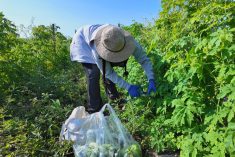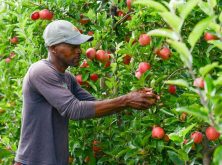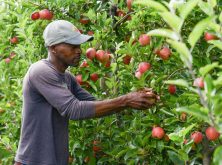A union and environmental charity have come together to launch a lawsuit against Health Canada over the health and safety of agricultural workers.
Why it matters: Health Canada is required to ensure that pesticide safety data sheets are available in workplaces.
United Food and Commercial Workers (UFCW) Canada and Ecojustice say the federal department has failed to protect agriculture workers by not enforcing material safety data sheet (MSDS) requirements. The data sheets are summary documents that provide information about the hazards of a product and advice about safety precautions.
Read Also

Women who fed a nation
More than 40,000 young women supported the war effort between the 1940s and early 1950s, helping grow and harvest crops amid labour shortages. They were called Farmerettes.
UFCW alleges some Ontario farms are relying on more complex and less easily understood product labels instead of comprehensive safety data sheets.
“We are noticing that, basically, there’s deficiency in the pesticide labels as compared to the safety data sheets,” said Rosemary Quinsey, national communications representative for UFCW.
“We want firmer regulations about these, we want to make sure that every single agricultural worker has adequate training, has access to the information they need in the languages they need.”
Quinsey said Health Canada is “suggesting that pest control labels can serve the role of those safety data sheets,” but added that’s not the case.
In a press release, UFCW Canada said the Pest Control Products Act (PCPA) “mandates Health Canada to ensure that pesticide registrants provide pesticide safety data sheets to workplaces” and alleges Health Canada is putting the health of farm workers at risk.
Ecojustice lawyer Laura Bowman said workers not knowing what pesticides they have been exposed to has been a consistent issue. She noted there’s a legal requirement, aside from the labour requirement, that safety data including material safety data sheets be a condition of registration, and that the firms producing the pesticides would provide those to workplaces.
“Health Canada has been treating that as voluntary,” Bowman said.
Farmers not the target
Bowman said the lawsuit is targeted at Health Canada and pesticide companies, not producers. Farmers are relying on the materials provided to them by the pesticide producers.
“The lawsuit itself does not directly implicate farmers at all,” she said. “This is about making sure that the pesticide companies create the safety data sheets and provide them to workplaces.”
“We understand that for some pesticides, there isn’t a safety data sheet that the farmer could be giving to their workers.”
That shortfall has to be addressed first, before providing the documents to workers at the farm level is an issue.
Bowman added there have been some issues with non-compliance, but those mostly relate to existing regulations. She encouraged farmers to stay up-to-date on what is required of them as an employer, like making sure all pesticides have proper labels on them,
Quinsey said agriculture workers — primarily temporary foreign workers — have told UFCW they are not being properly trained on use of pest control products. They also say safety information is often not accessible in their languages, a problem when many TFWs come from Spanish-speaking countries.
“We have, as part of numerous different consultation processes, asked Health Canada numerous times to make labels available in other languages,” Bowman said.
She noted the documentation can be complex, lengthy, and contain very specific instructions that can vary from crop-to-crop and application method.
“They are not user friendly in any way,” she said.
That means a simply mistake or misunderstanding can result in a high level of exposure for workers, and that can be due to lack of information, or because the worker gave up in frustration because the information they got wasn’t understandable.
She added this is not the fault of the farmer, as workers and producers alike cannot be expected to have a full grasp of the very technical details of pesticide use.
She said this is where proper safety data sheets would be necessary.
“They’re standardized language, they’re intended for workers, and also it can give you a bit more motivation to follow the label instructions more carefully, if you understand what the consequences might be if you don’t,” she said.
In a press release, a Guatemalan agriculture worker named Francisco said he has been told to use pesticides without any PPE or training.
“I don’t know how many times I have felt my skin burning, my head spinning, or my stomach turning until I throw up,” he said. “But what can I do? This job in Canada is my only chance, my family back in Guatemala depends on me. Without it, my kids won’t go to school. The boss knows that and takes advantage of that.”
Quinsey said this problem was flagged to them during a 2024 report on the state of health and safety for migrant workers.
UFCW is calling for proper training on pest control products for agricultural workers in their lawsuit.
The union filed the lawsuit because it represents more than 2,000 workers in the primary agriculture sector who are directly affected by exposure to pest control products in the workplace. She added it’s the federal government’s responsibility to ensure workers are protected.
“They have a right to know what the products are they’re using, … what the risks are, and what protection they should be entitled to,” Quinsey said.
Bowman said the ideal next step in the process would be to hear from Health Canada that they’ll be implementing the regulation and all pesticide registrations in the future will require an MSDS as a condition of registration.
“It shouldn’t be complicated for them to implement that,” Bowman said. She added there’s a need for other improvments to farm worker safety, including ensuring workers are “fully covered” by occupational health and safety legislation provincially, and clear worker protection standards need to be put in place on farms at the federal level.















